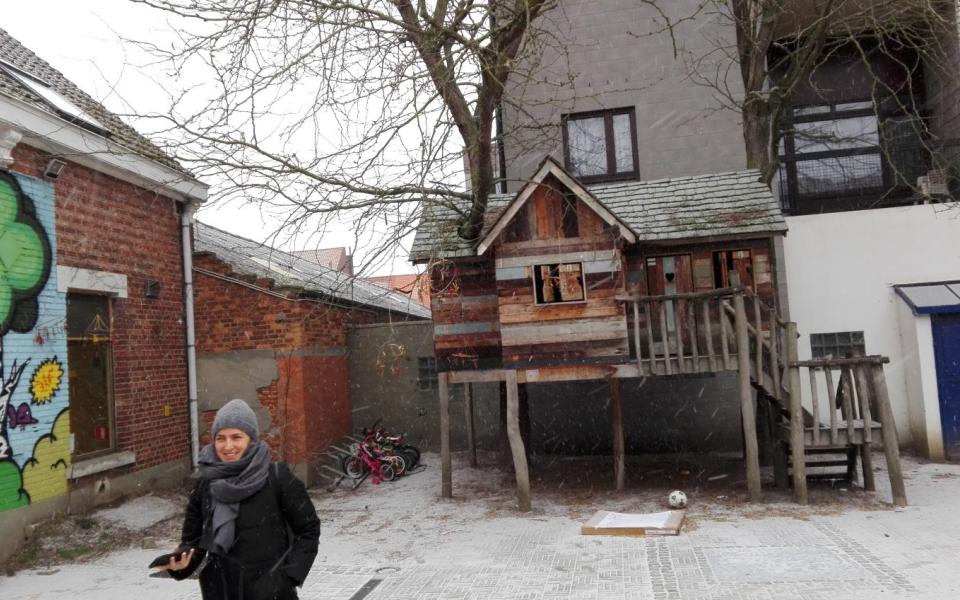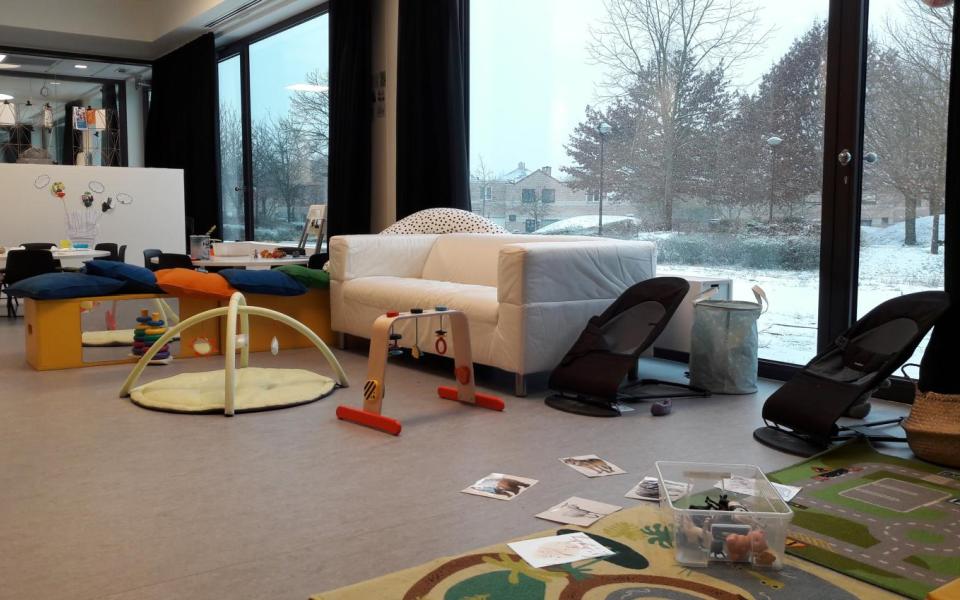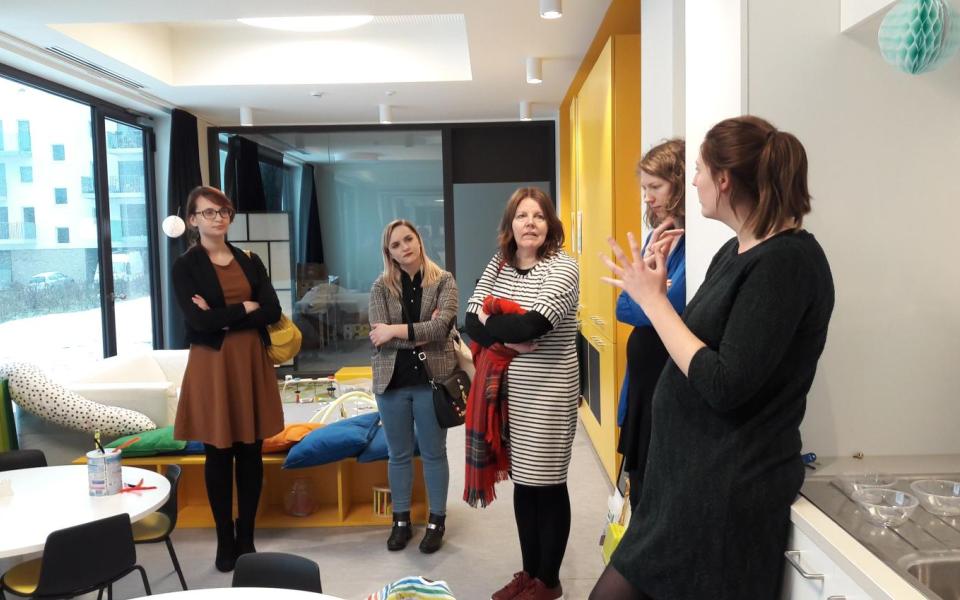Brussels Schaarbeek
ABC (Art and Education)
Elmer (Child care)
Baboes - open meeting place - IAS Study visit
Baboes is a meeting place and is open to parents with children from 0 till 5 years old. They have a clear vison on empowering people. Parents visiting Baboes are very diverse (vulnerable people, employed or unemployed, mothers and fathers, from expads to illegal immigrants…). Baboes is organised at different locations and during the whole week, in order to reach this diversity of families. Baboes works with ‘hosts’: 7 hosts (5FTe) are working alternated two by two, on the different locations. This stimulates sustainability, reflection and discussion about their interventions.
Strengths:
- the possibility that the parents take care for the children
- place to ‘teach’ the responsibility, to engage themselves through playing with the children, to chat with other parents, to dare point out on each other responsibility
- the element of ‘trust’ is very important: professionals are present as ‘the invisible experts’ and makes interventions in order to bridge and bound, they guide parents towards solutions by bonding and bridging. A complex construction is not always necessary – placing your trust in families can be enough to go forward.
- ‘being present’ within ‘a neutral position’ needs competences
- Low threshold for families: they can meet other parents without having to do something special. They simply can have a talk or they can cook something together.
Challenges and topics of discussion:
- (Norway) have a lot of similarities, but in some way it is also very different: it is a challenge to look further on the competences host needed. There is a duality of bridging and bonding. When can one focus on peer support or when and how to connect to other partners in the network: it is the discussion of what is on the first level, and what should be targeted (both in the centre as outreachend)
- Limited number of visitors and free of charge? In Baboes there is no limited number, but if there are too much participants, it can be very crowded and the host becomes rather a ‘security guide’ than a ‘host’. In Slovenië, the number of parents participating is limited, so quality and safety can be guaranteed. Therefore participation is not free of charge (with some exceptions e.g. refugees). Norway had the experience that the most vulnerable people no longer participated if they had to pay a fee. So they changed their policy.
- How to reach most vulnerable people? But previously, one has to reflect on vulnerability. Do we not classify parents to easily in vulnerable versus not vulnerable?
- How to cope with multilinguism? Baboes uses ‘Dutch’ as the common language (also a condition in order to get fonds). But parents can ‘translate’, or other languages can be used in order to understand each other.
- Educational degree of ‘hosts’:
- The ‘Hosts’ of Baboes are recruted on basis of their competences of ‘being present’ (no professional degree is needed). They have to be expert in “doing nothing”, in being the invisible expert.
- Most of the ‘hosts’ are able to speak different languages. It is a challenge to find ‘hosts’ who speaks ‘Dutch’ fluently. For some of them ‘Dutch’ is a third/fourth... language.
This differs from other countries. In Norway ‘hosts’ in a family centre are educated pedagogues, social workers, children's caregivers...
-
Multifunctional space?
- The space is used by different organisations and gets a different functionality regarding the organisation using it (e.g. waiting room for consultations Kind en Gezin)
- In Finland, the space belongs to one organisation, and it is the same staff that uses the space differently according the activities.
- In Norway, other organisations can ‘lend’ the space to organise their activities. Also parents can organise themselves and make use of the space (e.g. maternity group).
- Outreach? Baboes experiments with small projects to go abroad. For example, they organises a ‘Baboes’ in a centre for refugees, where children and parents can play and cook together.
't Lampeke - study visit IAS
Target Group
't Lampeke can be found in the Ridderbuurt in Leuven. The non-profit organisation works directly with the underprivileged target group and is explicitly attuned to people inside and outside the neighborhood who, for whatever reason, are socially vulnerable or are threatened with it. The aim is to notice and break down poverty and social exclusion and to support people by tackling problems together with them.
The organisation exists already more than 50 years and is a fixed value in Leuven. Everyone is welcome and can go there with any questions. The organisation offers cozy meeting places and various activities for all age groups. Attention is paid to families, couples and singles. Realizing equal opportunities and rights for everyone within a solidarity society is the ultimate goal.
What we do: 1 +1 +1 +1 = much more than 4
The organisation consists of four main operations:
-
day care de Wurpskes for babies, toddlers and their parents / families,
-
children's work Fabota for children of pre-primary and primary school and their parents / families,
-
youth activities den Tube for youngsters from 12 to 25 years and
-
community center 't Lampeke for adults.
The four operations work closely together with an integrated offer. More information on the website www.lampeke.be(dit is een externe link)
We organize groups on specific themes ( education, culture, energy, housing, ..) We develop in-depth projects bases on the needs of families: housing, language, education, attachment, energie, health, participation, .. We are at a crossreads between all areas of live: education, health, culture and leisure, living, employment, .. We want also to influence politics.
Ambition
Buurtwerk 't Lampeke works together with a diverse group of people on a warm and inclusive society without poverty and social exclusion. Everyone is welcome and we put each other in our strength.
Working with families
Central are low-threshold and warm 'places' in the neighborhood with attention for individual and warm tailor-made care, meeting opportunities and substantive activities. Working with families is central. Our work is a strengthening place to develop both individual talents and social networks. Where necessary, we offer long-term projects with an unconditional way of working. From our recognition as a local preventive family support service, working with families gets even more structural embedding.
Contact
Buurtwerk ’t Lampeke vzw
Riddersstraat 147, 3000 Leuven
016 23 80 19 – info@lampeke.be - www.lampeke.be(dit is een externe link)
Check also: www.hoopverlening.be(dit is een externe link), www.overbruggen.be(dit is een externe link), www.lezenisleuk.be(dit is een externe link) V

Wigwam - child day care with broadening of services - IAS Study visit
Through a unique and integrated program, Wigwam tries to get vulnerable families out of isolation and to fight child poverty in an early stage. In Wigwam different people from all over the world meet each other in a tolerant environment, which increases integration and community building.
1. Organisation
- vzw with a by “Kind en Gezin” certified and subsidized child day care:
- with focus on vulnerable families who live in the neighborhood
- with a meeting point for families with young children
- offers an integrated, approachable preventive support program
- located centrally between the multicultural neighborhoods Blauwput and Casablanca (Kessel-Lo), where many vulnerable and disadvantaged families live. In April 2017 Wigwam moved to anew, own building, where also the Consultation office for the Young Child Kessel-Lo and theregional team Leuven of Kind en Gezin are housed
- it was launched in September 1995 as a deprivation project. Currently 45 permitted places – of which 35 places subsidized- are available in 3 groups, of which 10 structural places forspecific caring needs
- target Group and Coverage:
- Neighborhood families, who have difficulties (financial, health, capacity), and given guidance on: welfare, housing, education, welfare, employment, child welfare, health,...
- 80 children and their families a year in our daycare, and approx. 100 children and their families, ex-families, future families and neighbors a year for peripheral activities. This last part of our program knows a growing amount of participants
- multidisciplinary team with 17 employees and about 10 volunteers / interns.
2. Objectives
Wigwam wants:
- to be more than childcare: an open and accessible house to all children and parents, warm and respectful, accessible, neighborhood-oriented, inclusive
- to provide opportunities to develop and acquire a place in our society
- to provide a link and seamless transition from family to parenting support, community work, and social work • to provide customized care for disadvantaged and vulnerable children and their families, at their level. Counter at an early stage child poverty and inequality through for example integration
- attention to the socio-cultural background of children, parents and staff
- no "assistance", no "authority". Parents should not submit a 'request for help' or 'articulate a problem'. They find their way easier to childcare than to other welfare organizations or assistance.
3. Why we do this! The achievements!
- The children develop in Wigwam their own identity and strong roots. Positive care makes children feel good, they develop much stronger capacities, talents, knowledge and confidence. We follow them intensively with observation booklets, child reviews, "care" diaries,... They are better prepared for kindergarten. The children obtain more confidence if their parents feel as well at home with us. Due to the numerous contacts with the parents we know their environment and needs.
- We stimulate the dynamic of early parenthood. Parents want to give their child opportunities they never got themselves. Parents receive energy and a network. For their various questions we ensure a seamless transition to parenting support and general welfare. There are letters that they do not understand, financial and relationship problems, education, health, housing, training, ... By the bond that develops we can seek together for furthersupport.
- Child care is ‘a dialogue’ between care givers and other parents. The shared care for children and the frequent contacts, sometimes for years, provide a bond of trust. Everyone, including neighbors and visitors are welcome and appreciated. Share experiences over a cup of coffee, play together, care together, party together, talk together about children and education. The social benefit is real through integration and the fight against inequality.
- Parents are involved in the operation: they are the primary educators. They are always welcome to participate in activities, cook or do chores. There are relaxing and supporting activities: trip to the zoo of Planckendael, relaxing, picnicking, multicultural celebrations, baby massage, information sessions about entering kindergarten, kindergarten and library visits, neighborhood party, sewing workshop, walk around the neighborhood, Wigwam Café, farewell parties, healthy eating sessions, etc. We also visit the parents at home. If necessary we provide visual support by using pictograms. If the parents are doing better, there is more space for the development and wellbeing of children. Greater stability and less burden creates a good educational environment. Children get more opportunities.
- Our multidisciplinary and multicultural team, also with volunteers and interns, works together with care providers and social workers. By participating in training and (research) projects we constantly question whether our approach is still good and if we can improve.
- What children, parents, and professionals know and can, their abilities and confidence, ... bundles. Bundled branches do not break. Parents experience support, without patronizing, making it easier for them to seek and accept future help. They experience (again) enjoyment of education and life. Links are established to other families, neighborhood and society, to institutions and to care givers and social workers. In Wigwam we see many wonderful things happen ... but the current subsidy is not sufficient for the family operation and family support. We can sustain through sponsors, one-off projects and gifts.
To end
Pictures tell more than theory. In collaboration with different organizations, for example ‘Kind en Gezin’, the Province of Vlaams-Brabant, KULeuven, UGent, etc. we published two booklets: “Kinderopvang en Ontmoeting” (childcare and dialogue/meeting) and “Kinderopvang en Huizen van het Kind” (childcare and Children’s Houses) with many pictures and a dvd about our operation.
In addition, we created two cardboard book for toddlers without text “Een dagje bij de vriendjes” and “Feest je met ons mee?”, signed by Kathleen Amant. Whatever the native language is, everyone can create his own story. The second book tells about different important festivities in the world. Diversity is in both books a main topic.
KOALA - IAS Study visit


Brussels Nieuwland - IAS Study visit
Some 10 years ago, a former high school moved away and these former buildings were now available for primary and secondary schools, a day care centre, several music schools and initiatives, and recently also the start of ‘Huis van het Kind Nieuwland’ (House of the child at Nieuwland), the location of integrated services focused on preventive family support.
‘Huis van het kind Nieuwland’ is welcoming all families who are looking for information about education and who are seeking their way in the specific systems to get inscribed in and find access to Dutch speaking day care centre and schools in Brussels.
- On Monday they can come with their baby or toddler to the consultation organised by Kind en Gezin: for a follow up of the health of their child with a nurse and doctor.
- Meanwhile, Babyboost offers a moment for new mums to exchange on subjects as breastfeeding, health issues, periods of sleep of the baby, …
- They also can join Baboes, the meeting place for parents or other educators and children until the age of their 5th anniversary. And recently Baboes are starting activities on a regular basis addressing the more vulnerable families.
All these integrated services are having the same objective of addressing questions and issues families are having as soon as possible, to avoid these to become real problematic situations.
Additional the network Huis van het Kind is also partner in the network of ‘Brede School’, together with kindergarten, elementary school, and organisations that offers leisure time activities for children. The ‘Brede school’ is an approach to offer maximum development opportunities to children and young people through a sustainable, effective and equivalent collaborations between organizations from different policy areas. The action plan Community School Nieuwland is drawn up using the five key aspects for the broad School: health, safety, talent development and fun, social participation and preparation for the future.
Participants: Ines en Duchi (Slovenië), Jarek (Poland), Ulla (Finland), Ingun (Norway), Nele, Christele en Kathy (Belgium) and Ingrid (host, Belgium)